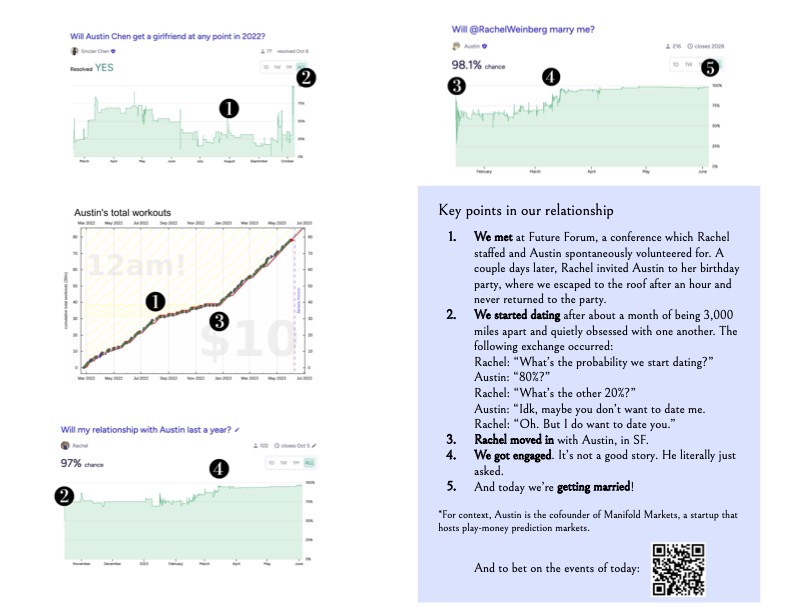
There are 103 people betting on whether Austin Chen and Rachel Weinberg will still be married in five years time. The aggregation of their bets puts the probability at 92%. The couple are more bullish—Chen puts the probability as high as 98%.
As is customary for users of the website Manifold, where people can bet on anything from the outcome of the 2024 U.S. Presidential Election to winner of Best Actress at the Oscars, they’ve both put their—virtual—money where their mouths are. If his marriage endures, Chen stands to win 6,483 Mana, Manifold’s play currency. (Mana are named after magical stamina in video games and can be purchased at a rate of one dollar per hundred Mana and traded in for charitable donations at the same rate.) Weinberg, who bet less than Chen, would collect a more modest 2,407 Mana. Users are given $10 worth of Mana free when they sign up.
Chen co-founded Manifold, along with brothers Stephen and James Grugett, in December 2021, with funding from both venture capitalists and charitable grantmakers. (Last year, Weinberg became a co-founder and engineer at Manifold’s affiliated charity, Manifund). The three men were eager to found a startup and were enthusiastic about prediction markets. “People talk about prediction markets all the time,” says Chen. “If the idea is so good, why aren't people using it? Can we make people use it more?”
The markets have been kind to Chen in the past. In 2022, Chen’s sister, Sinclair, set up a market on Manifold to elicit the chances he’d get a girlfriend in 2022. She and Chen’s brother Alex both bet no, with Alex justifying his bet in a comment: “Unlikely. Source: Have known Austin for 25 years.” An indignant Austin bet yes, cashing in after he met Weinberg at a conference later that year.
Chen and Weinberg’s relationship was moving fast, so Chen decided to open a market for trading on whether he and Weinberg would get married. This caused a “kerfuffle,” says Chen, after Weinberg mistook him sending her the market for a marriage proposal.
“Later I did formally propose to her, and the way she reacted was to then go and bet on this market,” says Chen. “Because she was the kind of person to be first okay with me setting up these markets, and [second] inside trade on this information—that's how I knew she was the one. “ They got married in June 2023.

On Manifold, anyone can set up their own market. By betting, users shift the market’s prediction towards their own prediction for the question. The market aggregates the predictions of the market participants, allowing prediction markets to put the wisdom of the crowds to the service of predicting real-world events, just as stock prices of publicly traded companies reflect traders’ aggregated assessment of a given company’s prospects.
For now, real money is off the table. But in future, Manifold could have both dollar and Mana denominated markets, says Stephen Grugett. While real money markets would likely draw in more trading volume and therefore offer more accurate predictions, Mana has its benefits too, says Grugget. For example, it’s less tightly regulated, allowing more playful creation of markets and less strict regulation, including the regulation of insider trading. Grugett argues that insider trading increases market efficiency, something many libertarian-leading economists have also argued.
Manifold has published statistics to show that their prediction markets are impressively accurate, predicting the 2022 midterm elections more accurately than Election Betting Odds and only slightly less accurately than polling site 538. The fact that the markets trade in play money doesn’t seem to matter—users are sufficiently motivated by the prestige of accruing Mana.
Although Grugett says Manifold is a “passion project” started by prediction market zealots, the founders have the commercial ambitions typical of a Bay Area startup. “I also believe that this can be a multibillion dollar business,” he says.
Back in the summer of 2023, the Manifold team began to wonder whether they should actively build markets for “higher value applications,” says James Grugett. After noticing that markets concerning dating and relationships consistently drew the attention of Manifold’s users, a large proportion of whom know each other as members of the extremely online rationalist subculture, Grugett decided to build a dedicated site for dating prediction markets to help users find romance. An early version of Manifold.love launched in October and the site was relaunched with new functionality on Feb. 10. Like Manifold, users are given $10 worth of Mana to start off with.
Alongside pictures and basic information like age, profiles display answers to prompts. Some are ordinary—”How much time do you prefer to dedicate to your work, roughly?”—while others pose the sorts of controversial questions popular among rationalists—”How would you feel about doing embryo selection to increase your child's IQ by 3 points on average?”
Manifold.love appears much like a standard dating site: users can browse other profiles, send likes, and “ship” potential matches between others, indicating their confidence in the pairing. However, if a user pays $100, this sets up a market where anyone can bet on who that user might go on a third date with. The $100 is placed into the market in the form of Mana, and is refunded if the user doesn’t go on any third dates within six months. Grugett says he carefully designed this setup to improve the chances of successful matchmaking—the $100 of Mana encourages people to speculate about who might be a good match, and the downpayment ensures only those who are committed to dating are available for betting, making it worthwhile for traders.
“There's almost two roles here,” explains Grugett. “There's the people who are dating and then there's just the matchmakers who just want to bet, I think that that can be fun—just being a trader.”
As someone who uses Manifold most days and knows many of the other people likely to sign up for Manifold.love, signing up was a natural step for Nathan Young, a forecasting consultant who attended Chen and Weinberg’s wedding. Until very recently, anyone could set up markets for any two users. While Young hasn’t yet paid $100 to set up the markets, he says that he took the market’s predictions about his compatibility seriously, and has messaged one of the people that traders predict might be a good match for him. “Other people's bets here tell me something about people's sense of my suitability,” he says.
Young also made predictions about other people’s compatibility. “I still know what people I know like. So I will go through, I will look, and I'll be like, ‘Oh, I know her. I know what kind of guy she likes.’ Or I'd be like, ‘Oh, I know him. I know what he's looking for in a partner.’ I think genuinely there is some chance of it providing actual good information.”
Asked whether he thinks others will participate in dating prediction markets as he does, Young urges those on the fence to lighten up. “Get on board with the drama,” he exhorts. “Bet it up! Bet it down! Speculate!”
For other users, the market functionality is largely surplus to requirements. Emmy Agrippa, a 27 year old software engineer who lives in Brooklyn and who also used the previous iteration of Manifold.love, compares setting up a market to Facebook’s retired poke feature, as an avenue for low-stakes flirting. “It's kind of like you spend one dollar to poke somebody and make this market,” says Agrippa. “Sometimes there's some activity on them, that's cool. But it's mostly friends chiming in and saying: ‘Oh yes, this guy.’”
Agrippa has found the market functionality has some use beyond flirting. “My existing partner made a market, and it was during a period of uncertainty, because I'm moving,” says Agrippa. “He bet the probability up to 80% that we date for the next six months.” Agrippa says that while that may sound low to some, she was touched.
So far, Manifold.love’s 1,747 users almost all belong to a collection of overlapping and very online communities—rationalists, effective altruists, and other associated nerdy groups. Will it ever be more than that?
James Grugett thinks so. “We're starting in this community. But we're going to take over the world. The entire purpose is to make something very valuable that scales to everyone. And I think these are early adopters—these are the people that would see it as not that weird,” he says. “It's the best way to match people on the internet. It's just gonna defeat all the other stuff.” However, he admits that the team is still trying to figure out a model for Manifold.love that will get them there and isn’t seeking to make a profit at the moment.
Young is less confident. “I would be surprised if it became as big as the smallest major dating app,” he says. “There's maybe a 2% to 5% chance that it becomes a stable dating app for a larger community, as OkCupid was towards the end.”
Naturally, traders on Manifold have been speculating. A market created by Grugett estimated the chances of Manifold.love reaching 1,000 daily active users by Valentines Day 2024 at 14%, an outcome that now looks remote. Young tells TIME he bet yes on the market after being contacted for an interview, predicting that media attention would boost Manifold.love.
More Must-Reads From TIME
- The 100 Most Influential People of 2024
- Coco Gauff Is Playing for Herself Now
- Scenes From Pro-Palestinian Encampments Across U.S. Universities
- 6 Compliments That Land Every Time
- If You're Dating Right Now , You're Brave: Column
- The AI That Could Heal a Divided Internet
- Fallout Is a Brilliant Model for the Future of Video Game Adaptations
- Want Weekly Recs on What to Watch, Read, and More? Sign Up for Worth Your Time
Write to Will Henshall at will.henshall@time.com